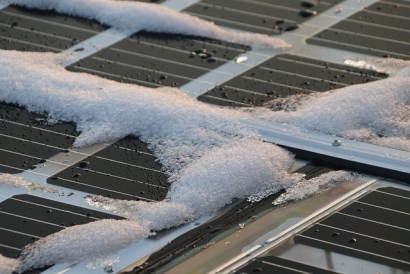
If you want your solar panels to generate as much energy as possible during the winter, you have to make sure you keep them clear of snow and ice. Unfortunately, getting access to rooftop solar panels after a snow or ice storm can be tricky since going up on your roof in slippery conditions can be dangerous.Some people remove snow from their panels with a long-handled broom or car scraper. If you have easy access to your roof and want to try this, make sure to go slowly and use care; you don’t want to damage your panels accidentally.
Most solar panel companies will offer advice for cleaning and maintaining your system during the winter, so don’t be afraid to ask them if you have questions.
Since your solar panels will produce less energy during the winter, you should do your best to reduce your energy consumption. The easiest way to reduce your energy usage is to use energy-efficient lightbulbs and make sure to turn off the lights in rooms you’re not using.
A more involved—but more effective—way to increase your energy efficiency during the winter is to ensure your home is well-insulated. Your home loses a surprising amount of heat through its windows and doors, so consider bolstering your home’s insulation by making sure they’re properly sealed. You should also cover and seal through-wall air conditioners since these are often quite drafty as well.
Some solar systems allow you to adjust the angle of your panels, which can boost their production when the sun is lower in the sky. Solar panels are less efficient in the winter because they don’t receive as much direct sunlight due to the shorter days and the sun’s position in the sky.If you have adjustable panels, set the angle lower than normal to about 15 degrees. If you want to get the most out of your panels, you’ll have to set the angle based on your latitude. Your solar provider should be able to help you with this if you’re not sure how to do it yourself.
It can be difficult to tell that your solar panels have a problem if you’re not tracking their production. If you notice any sharp drops in energy production, you might have to have a technician take a look. Snow and ice not only block sunlight when they accumulate on your panels; they can also damage your system, leading to lower energy production and a less efficient system overall.
You should see a steady decline in energy production as the days get shorter, but sudden drops are often a sign of trouble and require your attention. Winter can be tough on solar panels, but damage from snow and ice usually isn’t a long-term problem if you get it taken care of quickly.

